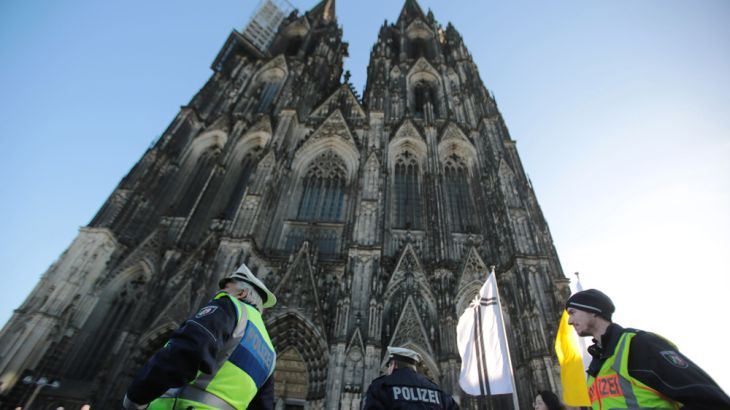Germany weighs deportations after sexual assaults
Critics of Merkel’s stance towards refugees seize on speculation about nationalities of perpetrators in Cologne attacks.

Nearly two dozen asylum seekers are among those suspected of involvement in mass assaults and muggings on New Year’s Eve in Cologne, officials said on Friday, intensifying a debate about Germany’s welcome of hundreds of thousands of migrants.
Some 121 women are reported to have been robbed, threatened, or sexually molested by gangs of men of foreign descent as revellers partied near the city’s twin-spired Gothic cathedral.
Keep reading
list of 4 itemsPrison demanded for Spain’s ex-football boss Rubiales in kissing scandal
The problem with British policing is not ‘just a few bad apples’
Homes of Sean ‘Diddy’ Combs raided amid sex offence lawsuit
The assaults have shocked many Germans and led to calls for tougher laws to punish migrants who commit crimes.
On Friday, Cologne police chief Wolfgang Albers, who had been heavily criticism for his handling of the violence and police communications afterwards, was dismissed.
|
|
| Refugees to boost Germany’s skilled labour force |
Some 1.1 million migrants arrived in Germany last year, far more than in any other European country, most of them fleeing war or deprivation in the Middle East.
Chancellor Angela Merkel has resisted domestic pressure to introduce a formal cap on the numbers, repeating her “We can do this” mantra to Germans. But the Cologne attacks have deepened scepticism among the population.
Cologne police said on Friday they had arrested two males aged 16 and 23 with “North African roots” suspected of involvement in the assaults.
Merkel said on Thursday in Berlin, “we must examine again and again whether we have already done what is necessary in terms of … deportations from Germany in order to send clear signals to those who are not prepared to abide by our legal order”.
Heiko Maas, Germany’s justice minister, said in an interview with the Funke newspaper that “deportations would certainly be conceivable”, adding “that penalty is in principle absolutely possible for sexual offences”.
READ MORE: Merkel says Germany will reduce refugee arrivals
Police said on Friday they have now received 170 criminal complaints related to the New Year attacks, including 120 of a sexual nature.
At least 22 asylum seekers have been identified from among 32 suspects in connection with robberies and assaults. They were believed to be among a group of up to 1,000 people in front of Cologne’s main railway station on New Year’s Eve.
However, none of the 32 is currently suspected of committing sexual assaults of the kind that have prompted outrage in Germany over the past week.
Interior Ministry spokesman Tobias Plate said the suspects were nine Algerians, eight Moroccans, five Iranians, four Syrians, two Germans and one person each from Iraq, Serbia and the United States.
Authorities do not yet have names for most of the men.
Speculation over the nationalities of the perpetrators has been seized on by some opponents of Germany’s welcoming stance towards those fleeing conflict, after the country registered nearly 1.1 million asylum-seekers last year.
Officials have cautioned that it is important not to cast suspicion on refugees in general.
Government spokesman Georg Streiter said the chancellor wants “the whole truth” about the incidents in Cologne and that “nothing should be held back and nothing should be glossed over”.
“It doesn’t just harm our rule of law but also the great majority of completely innocent refugees who have sought protection” in Germany, he said.
Merkel said the New Year’s assaults were “repugnant criminal acts that … Germany will not accept” and that legal changes or extra police presence may be examined.
“The feeling women had in this case of being at people’s mercy, without any protection, is intolerable for me personally as well,” she said. “And so it is important for everything that happened there to be put on the table.”
|
|
| Assaults in Germany heighten anti-immigrant sentiment |